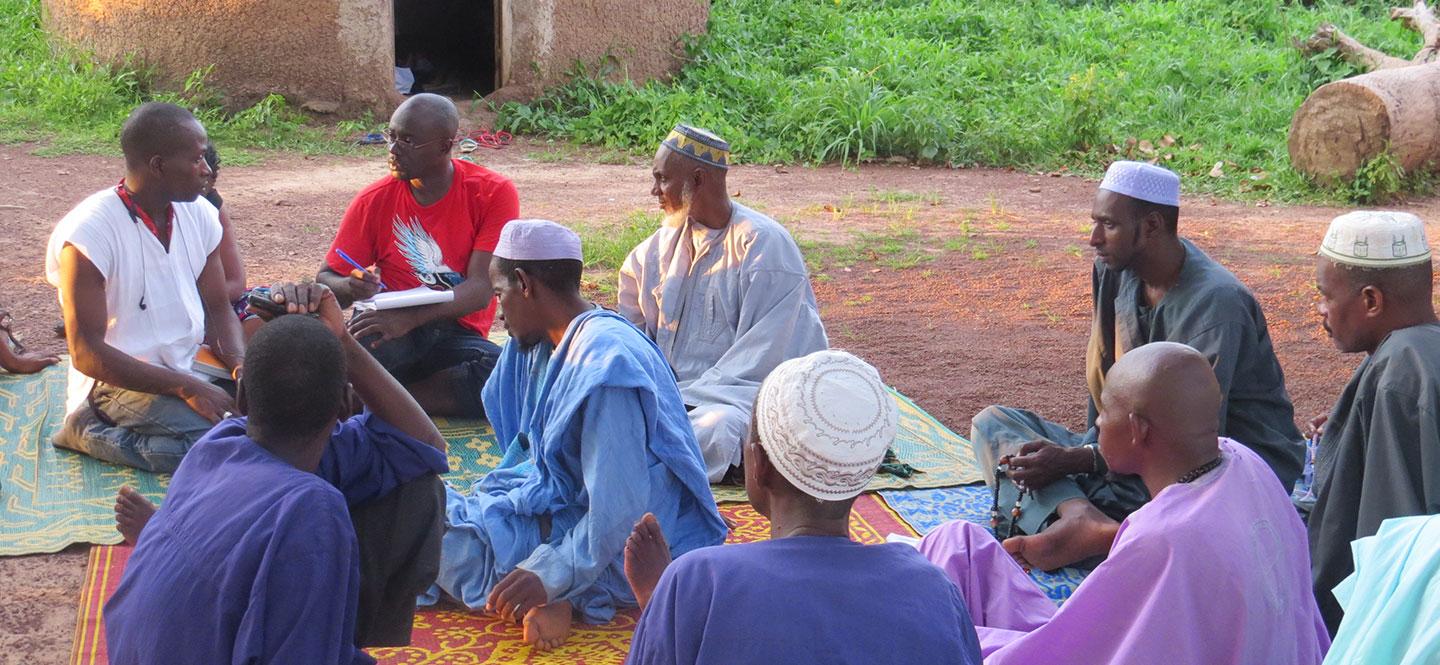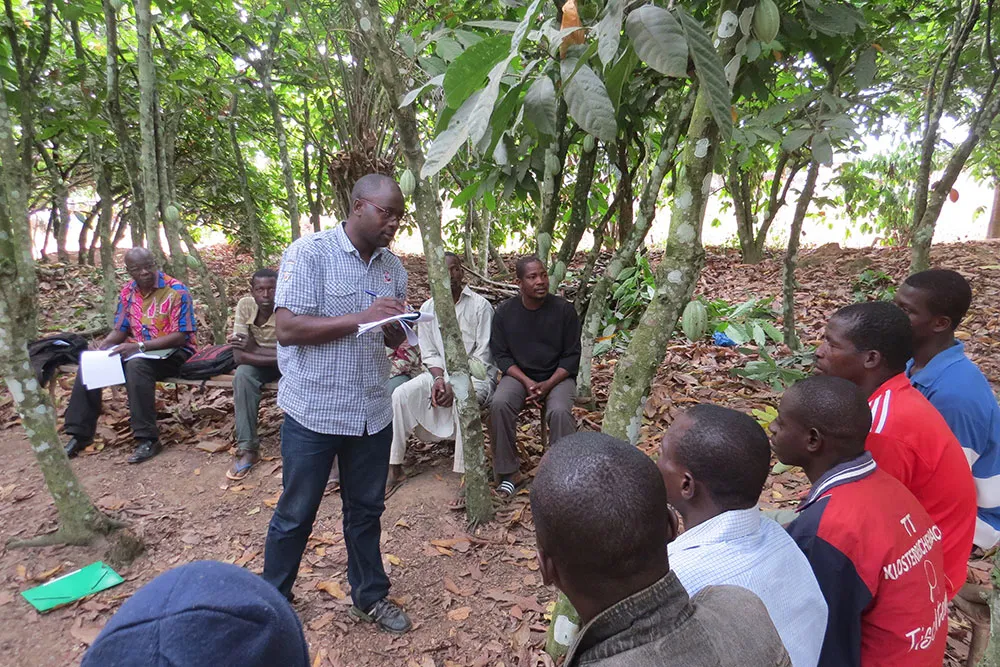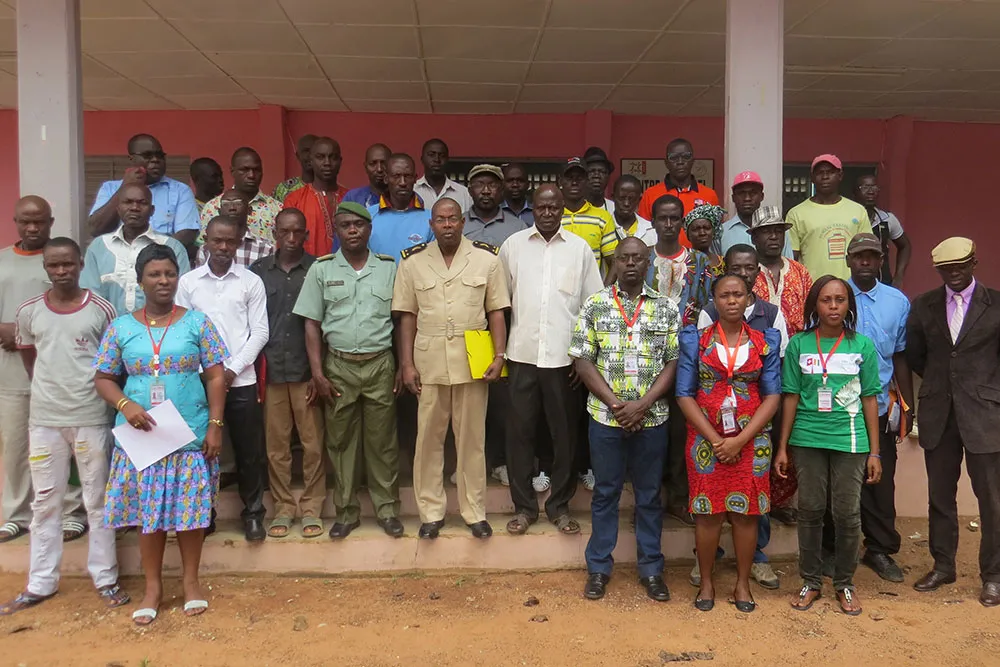Supporting Science in Sub-Saharan Africa: On the satisfaction derived from developing solutions

Amoin Jeanne d'Arc Koffi
Gilbert Fokou in conversation with sedentary pastoralists about natural resource management arrangements in the north of the Republic of Côte d'Ivoire.
Not only crises caused by political upheavals or famines continue to wreak havoc on societies and communities on the African continent. Gilbert Fokou, a social anthropologist from Cameroon, sees himself as a bridging interface between the people and decision-makers in politics. He is driven by a strong determination to help the very poor.
...I wouldn’t hesitate to do the same again.
His dream of becoming a physician was shattered shortly before he graduated from high school. Because he was very interested in biology but not quite as good at math, the teachers put the young Gilbert Fokou in literature and philosophy courses instead of science subjects. Nor was the now 46-year-old completely free to choose what to study at university: "While spending the vacation in my home village, I got a letter from my brother, who was living in the capital Yaoundé at the time." The letter urged Gilbert Fokou to enroll in social anthropology – a subject that Gilbert admits he initially did not know much about. However, today, after 20 years of studying, doing research and teaching in the field, he realizes it was exactly the right choice: "Even if it wasn't entirely my own decision, I wouldn’t hesitate to do the same again."
The fact that Fokou is so successful in his work has a lot to do with his own life story. His parents were peasant farmers who grew coffee, corn, beans, cassava and potatoes. The family sold what little of the harvest they did not need themselves and used a substantial part of their meager earnings to pay for their children's school fees and to allow them to study. As social sciences had become more important due to the growing awareness of the social and cultural dimensions of issues like HIV/Aids, environmental hazards, and their importance in large development projects Gilbert Fokou enrolled in social anthropology as recommended. "In the mid-1990s, that seemed like a guarantee of a job after graduation", Gilbert Fokou says.
Acting as a bridging interface
How does a society function, how is it structured? What influence do political upheavals, poverty, famine, and events such as drought have on communities? Questions like these also interested Fokou because he wanted to help find solutions for improvements in food security, health, education, and agriculture. "As a social anthropologist, I see myself as a bridging interface between the population and politics." At first, that sounds rather technical and uninspiring. But Fokou really enjoys his work, and a little pathos resonates when he says his research can help put a smile on people's faces.
Thanks to the funding, that was the first time I had the opportunity to plan a project myself and set up my own team.
Gilbert Fokou received his PhD in 2008 from the University of Yaoundé 1 in the capital of Cameroon. He then moved to the Sahel Institute in Bamako, Mali. Since 2010, he has been conducting research in Côte d'Ivoire at the Swiss Centre for Scientific Research in Abidjan. Then, in 2013, Fokou received a senior fellowship from the Volkswagen Foundation as part of the funding initiative "Knowledge for Tomorrow – Cooperative Research Projects in Sub-Saharan Africa".
"Thanks to the funding, that was the first time I had the opportunity to plan a project myself and set up my own team," Fokou says. He focused his project – with which he was successful in the "Livelihood Management" call for proposals – on the survival strategies of peasant farmers and pastoralists in northern Côte d'Ivoire. In their search for usable grazing lands, cross-border migratory movements of transhumant pastoralists often trigger conflicts in a context of climate variability and land use dynamics.

Discussion with young cocoa producers on natural resource management in southwestern Côte d'Ivoire.
Asking the right questions to find solutions
"First, we informed the inhabitants of a few selected villages about our project," says Fokou. If they were willing to participate, the researchers, including economists and geographers, first organized a kind of socio-ecological rapid appraisal. Walking through the villages and the surrounding area, they observed and described the physical conditions, soil conditions, land use, how the people live, and the kind of social activities they engage in. "Then it was left to me to develop different tools for data collection, for example through surveys, key-informant interviews and group discussions," explains the anthropologist. The challenge was to come up with the right questions.
The aim of researchers on the field was twofold: 1) collecting data that would be scientifically processed and analyzed based on existing or developed theories and concepts: 2) helping community members to reflect on their own problems. In this latter case, on the one hand, researchers were supposed to help the participants better understand their situation by encouraging them to take active part in diagnosing their problems. On the other hand, they were supposed to lead the debates and get people to propose solutions themselves based on their own experiences and potential. If everything went well, recommendations could then be made to the respective decision-makers in the village or at the local government level and, ideally, action plans could finally be derived, Fokou explains.

Participants of a workshop on natural resource management in northern Côte d'Ivoire.
Expanding the research ecosystem
"My research career has changed a lot since I received the grant ten years ago," Fokou says. He believes that in collaborating with German institutions he learned much about international science culture and the access to scientific literature. Those were important steps in building his skills, he says. "I also became more visible and better-known within the local universities”.
My research career has changed a lot since I received the grant ten years ago.
His international visibility also increased via the presentation of his results in research journals and at conferences. "My research ecosystem has expanded significantly." New research projects and collaborations have emerged through cooperation with German partners and other fellows of the Foundation. The latest example: Fokou is co-principal investigator of a current collaborative project in the Foundation's "Preventing Pandemics" funding initiative. The researchers, who come from Ivory Coast, Senegal and Germany, among other countries, are focusing on the consumption of so called bushmeat – and the associated risk of pathogens spreading from animals to humans. The project's title: "Co-creating and evaluating behavioral change interventions for reducing the zoonotic risk associated with wildlife consumption."
Finding alternatives to wildlife consumption
Fokou already has some experience with the topic. Because of the Ebola outbreaks, political leaders imposed a ban on bushmeat in parts of West Africa a good ten years ago. Fokou investigated what consequences this had for the population, especially in rural regions where wild game meat had long served as food security. The study concluded that when the consumption of wild animals is banned, alternatives must be available for the population. People will inevitably have to look for new food sources: Wild meat is partly replaced by fish and mushrooms. But for this to work well, they first need support, for example in fish farming.
"My ambition is to find tangible ways to help the people around me, especially the poorest," Fokou says. The fact that he is now able to contribute developing solutions to their problems via the research field of social anthropology, which was actually not his first career choice, makes him very happy.
